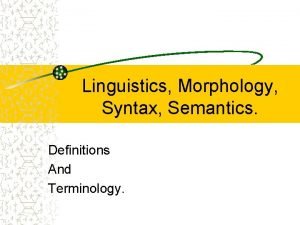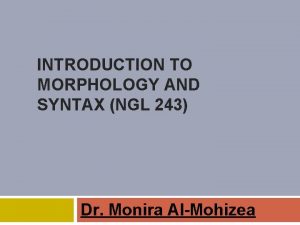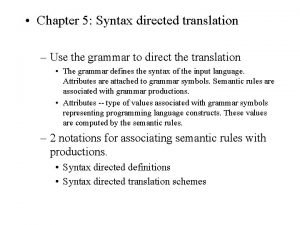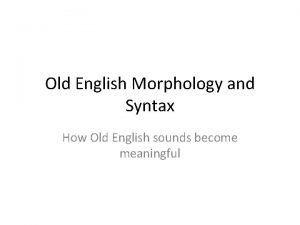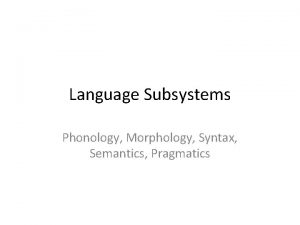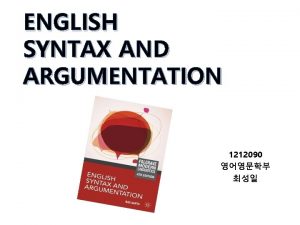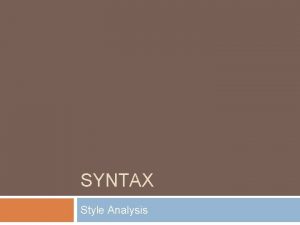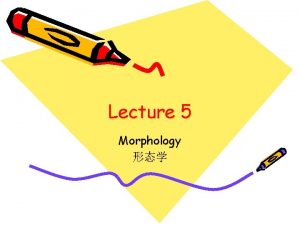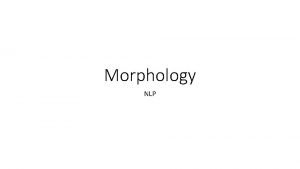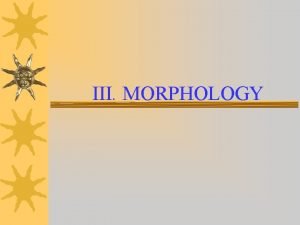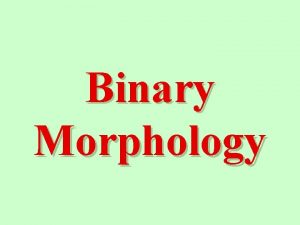Old English Morphology and Syntax How Old English








- Slides: 8

Old English Morphology and Syntax How Old English sounds become meaningful

Old English Morpholgy • Lexical morphemes combine with grammatical morphemes to create words • Noun heofon ‘heaven’ + noun ric ‘kingdom’ + inflectional ending representing the genitive singular es= heofonrices ‘of the heavenly kingdom’ • Lexical morphemes combine together to make compound words • Adjective middan + noun geard = middangeard ‘middleearth’

Nominal Morphology • Word forms of nouns depend upon the case of the noun • This whole discussion relies on your understanding of the parts of speech and the basic terms of syntax. • Case is one part of an inflectional system in a synthetic language – A code that marks the grammatical function of a word in a sentence – Example: “I like him. ” – I is the subject – Him is the direct object – We could express those ideas like this: – {singular first person pronoun morpheme} +subject – {singular third person pronoun morpheme} +object

Old English Cases • Old English had four cases – nominative (the case used for subjects and the complements of subjects) – accusative (the case used for direct objects and the objects of prepositions that have to do with time or space) – genitive (the case used to express possession or partitivity) – dative (the case for indirect objects or for the objects of verbs)

Cases in Sentences • From Burnley, Ch. 3: • OE Wæs hē se mon in weoruldhāde geseted… • Tran. Was he the man in worldly-station settled… • Burnley, p. 33 He was, this man, settled in the worldly estate. • The verb wæs is a “copulative” verb, which means that it acts as if it were an equal sign. • Both hē and the phrase se mon are in their nominative form. – hē is the subject of the sentence and se mon is the “subject complement” – geseted is a past-participle with both the –ed we’re accustomed to from PDE and the prefix ge-, which is part of the “discontinuous” past participle morpheme of OE.

Accusative Case • Used most frequently for direct objects of transitive verbs • p. 32 æfter tēode firum foldan ‘after decorated for men the fields’ – decorated (transitive verb) the fields (direct object) – tēode (transitive verb) foldan (direct object—plural accusative case) • Also used in constructions indicating time or as the object of prepositions indicating movement • p. 32, oð þā tīde ‘until that time’ (singular feminine accusative) • p. 46, Sōðlice sēo sunne gǣð be Godes dihte betwux heofenan and eorðan ‘truly the sun goes by God’s command between the heavens and earth’ [the phrase gǣð betwux triggers use of the accusative here]

Genitive and Dative • Genitive indicates possession or partitivity, or (rarely) the object of verbs of depriving • p. 46, Godes dihte ‘(of) God arrangement’ or ‘God’s arrangement’ • p. 52, mænig guma norþerna ‘many men of the north’ • Dative indicates indirect objects and objects of most prepositions • p. 32, æfter tēode firum foldan ‘after decorated for men the fields • 32, ic for þon of þeossum gebēorscipe ūtēode ‘I because from this beer-ship went out’

Results for Old English Syntax • Old English syntax is comparatively free • You must always ask, “Would the verb that translates the Old English verb be transitive— requiring a direct object to make sense—or intransitive? If it’s intransitive, is it copulative? If it’s a “to be” verb, you will always find two words (the subject and subject complement) in the nominative case. • Old English Aerobics Workout Room
 Inflectional morpheme
Inflectional morpheme Examples of syntax
Examples of syntax Differences between morphology and syntax
Differences between morphology and syntax What is syntax and semantics
What is syntax and semantics Introduction to morphology and syntax
Introduction to morphology and syntax Syntax directed definition and syntax directed translation
Syntax directed definition and syntax directed translation Old english syntax
Old english syntax Phonology morphology syntax semantics pragmatics
Phonology morphology syntax semantics pragmatics English syntax and argumentation 연습문제 답
English syntax and argumentation 연습문제 답



